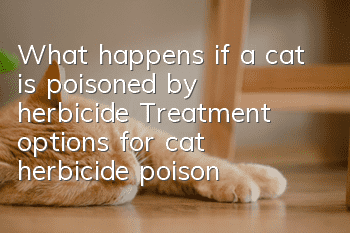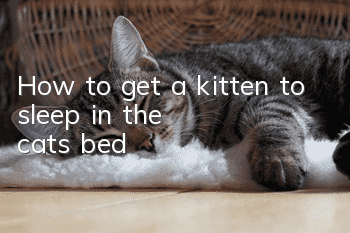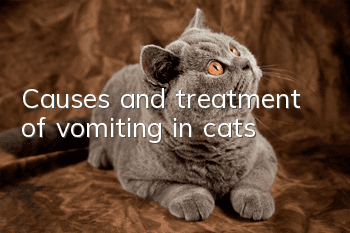What happens if a cat is poisoned by herbicide? Treatment options for cat herbicide poisoning

What happens when cats are poisoned by herbicides? Herbicide poisoning mainly occurs when herbicides are sprayed on the lawn in a community, and then cats go to play on the grass and accidentally come into contact with the herbicides, causing poisoning.
There are two types of toxic substances in herbicides, causing different symptoms and mechanisms of action.
1. 2-Methyl-4-chlorophenoxyacetic acid
Potential toxic and side effects
1. Route of exposure: inhalation, eyes and skin.
2. Eye contact: severe irritation.
3. Skin contact: Mild irritation. Overexposure and skin absorption may cause headache, dizziness, nausea, vomiting, gastrointestinal irritation, weakness and central nervous system depression.
4. Inhalation: Low inhalation toxicity.
5. Ingestion: Swallowing into the body will cause damage. May cause headache, dizziness, nausea, vomiting, gastrointestinal irritation, weakness, and central nervous system depression.
6. Effects on existing diseases in the body after exposure: Inhalation of this substance may worsen existing chronic respiratory diseases such as asthma, emphysema or bronchitis. Skin contact may worsen existing skin conditions.
7. Subchronic effects on target organs: Repeated exposure can cause damage to the liver, kidneys, blood biochemistry, testicles and systemic motor functions. Cases of peripheral nerve injury have been reported, but are rare, and numerous animal studies have not demonstrated these symptoms, even with long-term use of high doses.
8. Chronic effects/carcinogenicity: The International Agency for Research on Cancer (IARC) classifies exposure to chlorinated phenoxy ester herbicides as Class 2B carcinogenicity.
9. Reproductive toxicity: Animal studies have shown that it can affect the testicles and reduce male fertility.
10. Developmental toxicity: Studies of MCPA (4-chloro-2-methylphenoxyacetic acid) on experimental animals have shown that giving it to maternal animals at toxic doses can cause fetal weight loss and delayed development of pups.
11. Genetic toxicity: There are some positive and negative research results, but overall, MCPA does not cause genetic changes.
2. Chlorinated phenoxy ester derivatives
①Source of poison
1. Chlorinated phenoxyethyl esters available on the market include 2,4-D, MCPP, and MCPA.
2. Occasionally, there are reports of dogs entering grassland that has just been sprayed with herbicides and causing poisoning.
3. Chlorinated phenyl esters are quickly absorbed through the gastrointestinal tract, but are difficult or almost non-absorbable through the skin.
4. The poison is quickly distributed in the liver, kidneys, and brain tissue after entering the body.
5. Chlorinated phenoxy esters are metabolized by the body and converted into low-toxic products.
②Mechanism of action
1. Chlorinated phenoxy esters exert their mechanism of action by preventing oxidative phosphorylation and the biochemical pathway of ribonuclease synthesis.
2. The electromyogram of poisoned dogs changes.
3. Chlorinated phenoxy esters have effects on most organ systems, including the gastrointestinal tract, kidneys, and skeletal muscles.
③Clinical symptoms
1. Bloody stools occur during vomiting, diarrhea, and acute poisoning.
2. Muscle rigidity, ataxia, and hindquarter weakness.
3. Intermittent convulsions occur during severe poisoning.
4. Increased activity at muscle attachment points and abnormal electromyography.
3. Treatment
1. If you eat:
Call the emergency center. If still conscious, give 1 to 2 glasses of water orally. Do not induce vomiting. Seek medical attention.
2. In case of skin contact:
Wash skin immediately with plenty of soap and water. Seek medical attention.
3. If inhaled:
Move to fresh air. If unable to breathe, give artificial respiration. Give oxygen if necessary. Seek medical attention.
4. If it enters the eyes:
Hold your eyelids open and rinse with water for at least 15 minutes. Seek medical attention, preferably an ophthalmologist.
With the arrival of summer, the grass and trees are becoming more and more lush. On the way to work and through the community, we often see workers spraying pesticides and herbicides on the grass. Here, I would like to remind all pet friends that when taking your cat out to play, you must prevent the cat from licking or eating grass. Especially after using insecticides or spreading rodenticides, you must pay more attention to keep the cat under control at all times. Within your own field of vision, please also consult the ingredients of herbicides, insecticides, and rodenticides commonly used in residential properties, so that you can take targeted treatment plans as soon as possible if something unfortunate happens.
- When your cat has 10 "little changes", what does it mean?
- Why does a cat tremble and cramp?
- What do kitten eyes look like in the dark?
- How to care for cat teeth
- Does the cat eat?
- The difference between cat conjunctivitis and keratitis
- Will the little local cat recognize its owner?
- Sleeping posture of cats with folded ears
- Can injured cats eat chicken?
- Can little blue cats eat nectarines?



